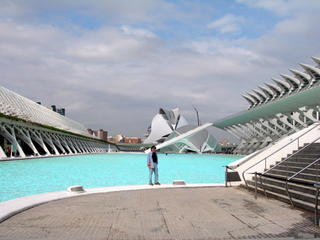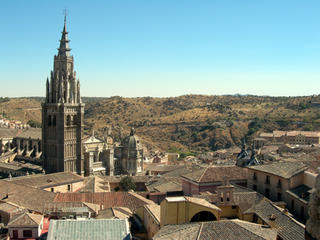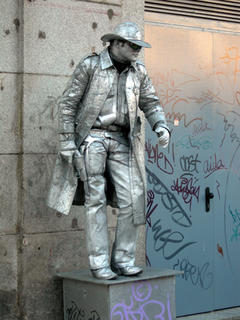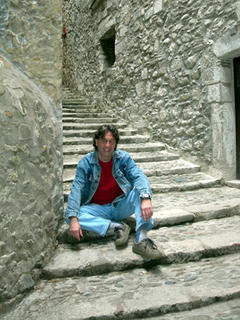Catastrophes follow so swiftly upon one another nowadays that ambitious writers, eager to capitalize on the latest misfortune, must look ahead to ones that haven’t happened yet. With this noble goal in mind, let’s gaze into our crystal ball for a glimpse at the fall programming highlights, 2007. Will the Entertainment State survive? Shadowy pictures begin to form:
CBS is showing its new sitcom, LESS IS MORE, a comedy with heart about a man who has lost his wife and a woman who has lost her husband, combining their randomly surviving children together into a big new plucky family.
--
NBC’s new season wouldn’t be complete without LAW & ORDER: H5N1. Here’s a preview clip:
[Exterior, Manhattan. A morgue wagon has stopped in front of a luxury apartment building in order to pick up the latest deposit of corpses. Old and young, white and less white, wealthy and more wealthy – the doormen toss all of them onto the pile with equal indifference, though always with a cynical shake of the head at the thought of lost Christmas tips]
Detective: Wait a second! [Approaches the wagon, putting on latex gloves; lightly lifts the head of a blond-haired child.] Look at the bruise marks on his neck. This one wasn’t flu!
--
Will football stop because of the plague? Not on your lives, sports fans!
Play-by Play Announcer: Green Bay has been lining up without a huddle all game. Dallas shows blitz – the ball is snapped – Favre is sacked, there’s a flag on the play – surgical mask penalty, fifteen yards for ripping the surgical mask. Now it’s second down and – cough, cough, cough…
Color Commentator: Hey, watch it, Biff! If only Dallas’ punts could be as accurate as your phlegm!
--
VH-1 weighs in with a new reality show, LIVE WITH ME. The premise: six people of varied origins have to live in the same house, using the same bathroom, eating in the same dining room. The survivor, of whichever gender, gets to be kept by Mick Jagger.
--
And of course there’s FEAR FACTOR: PLAGUE EDITION. Every contestant on this season’s FEAR FACTOR will have to submit to the same terrifying ordeal: sit for ten minutes in an internist’s jam-packed waiting room.
--
On the religious networks, it’s business as usual:
TELEVANGELIST: And as He struck down Sodom and New Orleans, brothers and sisters, He in his righteous wisdom has now struck down Los Angeles and Washington and all the other depraved dens of sin that once blighted our land. We’re going to build a new America, an America of holiness and heterosexuality – but we can’t do that without your help. Send your checks to – cough, cough, cough…
--
But to learn more about what’s happening in our world, let’s turn to the cable news:
ANCHOR: President Bush repeated his assurances to America today, saying, “I want all you good people to, you know, you can just keep going on about your normal lives. That’s the way to show these viruses they can’t beat us.” Coming up next on our Science Special: How long will that vaccine take to get here? We’ll have an expert’s view after we get back.
[Insert commercials for facial tissue, allergy pills, life insurance, and an overnight economic phenomenon, a nationwide chain of franchise crematoria.]
ANCHOR: We’re back, and our Science Special’s going to ask, How long will that vaccine take to get here? But first, here’s a story about how one man erected a lasting tribute to a fallen friend…
--
So many channels, each bravely adapting in its own way! But after so much grim reality we can all use a laugh, can’t we? Never fear, Comedy Central is showing endless reruns of the Three Stooges to cheer us up. Between episodes it shows a still promo, the same one each half hour: a crudely printed sign saying, “Comedy Central is searching for qualified video crew, on-camera talent, and office staff, so that we can continue creating the kind of quality entertainment you expect. Please email your resume – do NOT visit our offices in person…”












